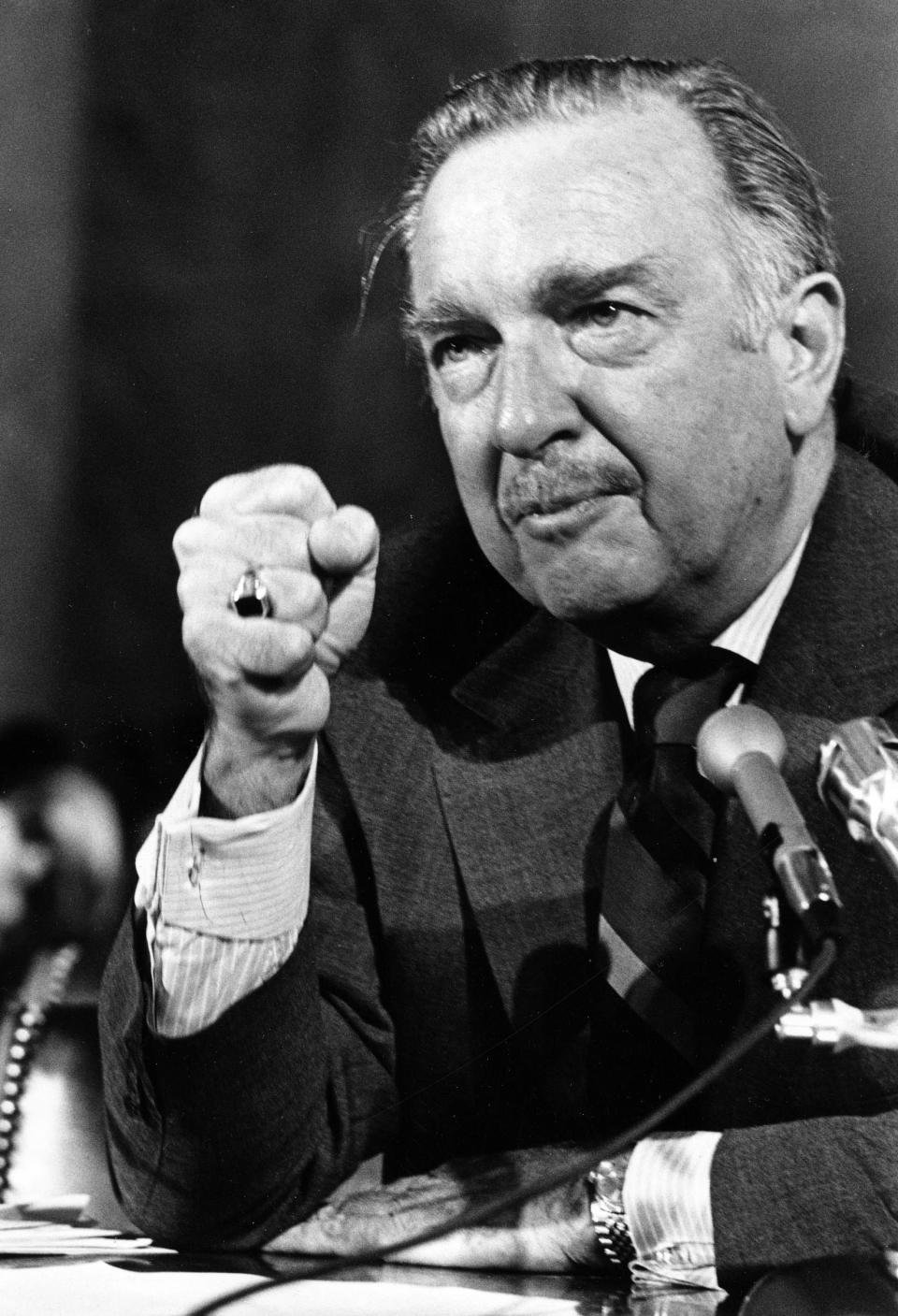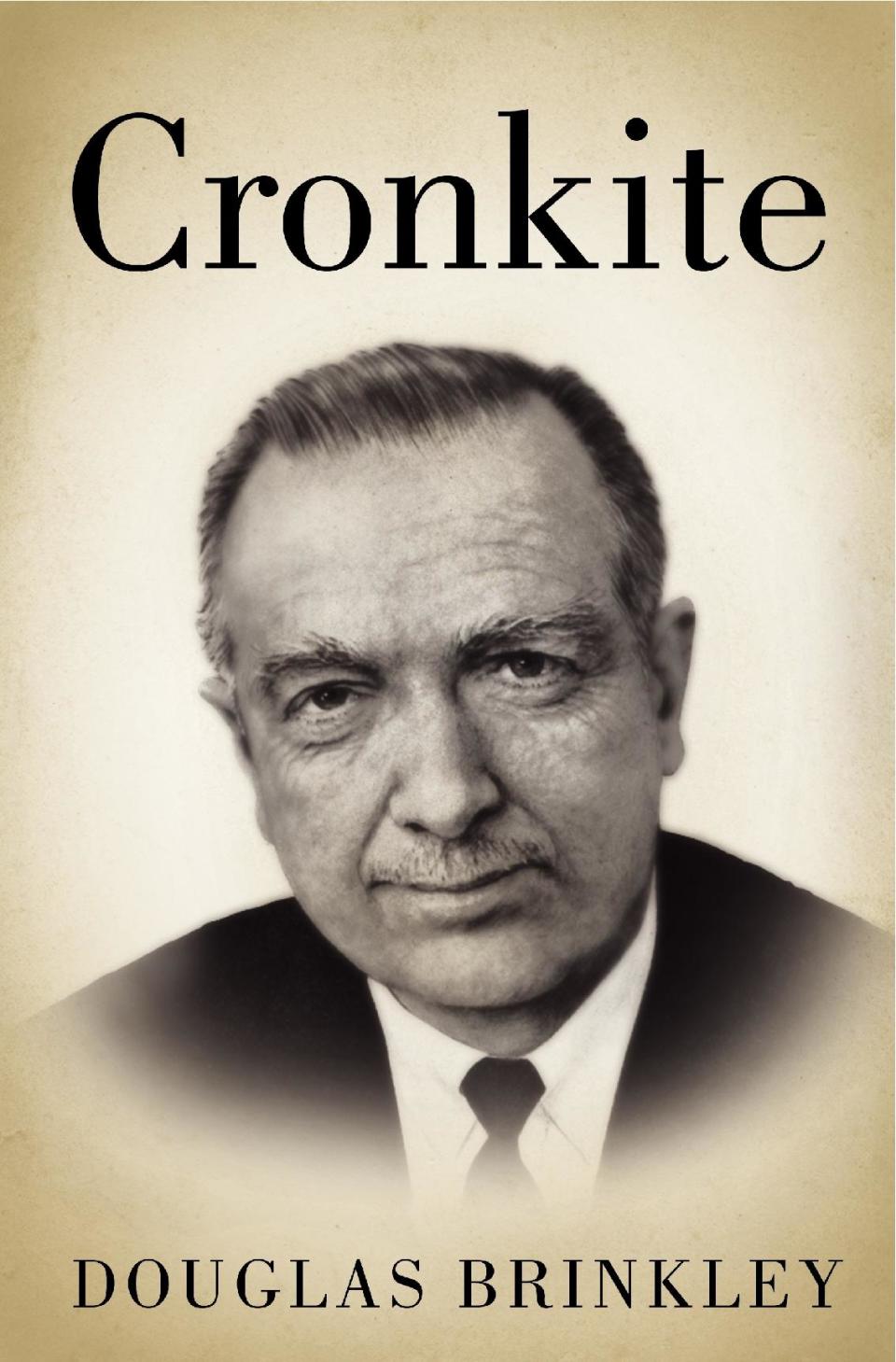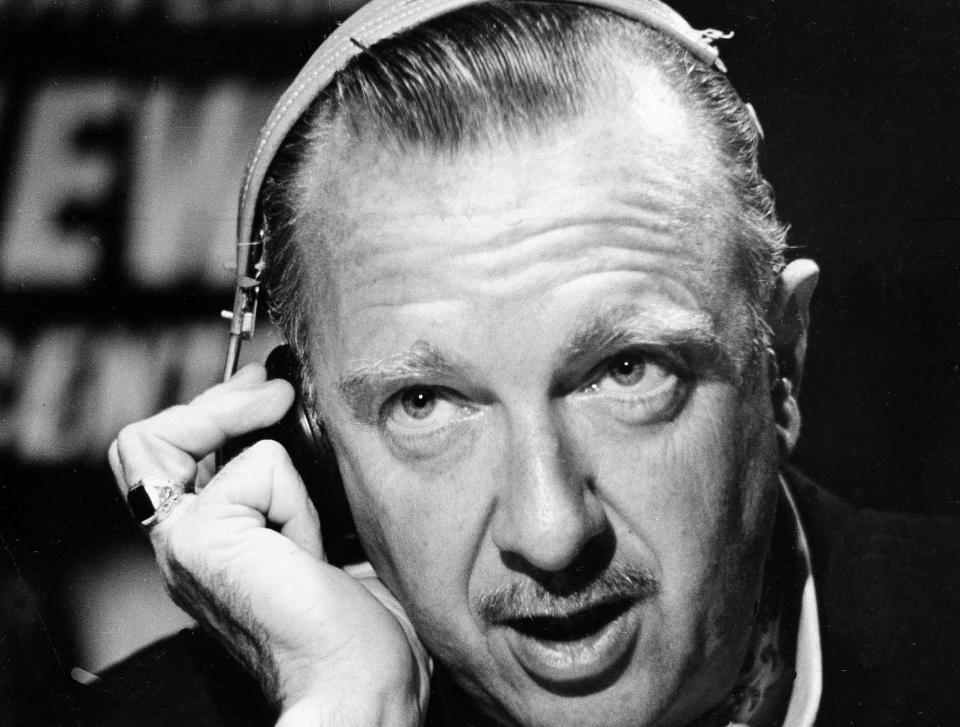Cronkite biographer calls him 'TV conscience'
NEW YORK (AP) — Walter Cronkite's power was considerable and he used it for good. He flourished in the bargain and lived a heck of a life.
None of that will come as news to the world he so reliably informed, but it is carefully and colorfully laid out in "Cronkite" (Harper), the just-released biography by Douglas Brinkley.
The CBS Newsman emerges from its 667 pages in a form that will be fully recognizable to his viewers and admirers: as the intrepid newshound, the reassuring authority, the cultural colossus who called himself "a reluctant big shot," upon whom was thrust the unsought mantle of "most trusted man in America" and who never betrayed that public trust.
He also emerges as a regular guy, lest anyone have harbored doubts that he was flesh-and-blood. He was a cheapskate (you wouldn't count on him to grab the check in a bar) and a man who enjoyed a few rounds while he was there (while swapping a few stories and racy jokes).
But Brinkley can count Cronkite's ethical lapses on one hand. At the 1952 Republication National Convention, he (with the support of his bosses) bugged a credentials committee meeting to give CBS a competitive edge.
In the early 1970s he accepted free vacations from Pan Am airlines for himself and his family.
And he lifted his signature signoff — "That's the way it is" — from CBS News' legendary Edward R. Murrow, never giving him proper credit. Murrow, who hired Cronkite at CBS but with whom Cronkite never got along, ended a World War II-era dispatch by declaring "That's the way it was," a line that, according to the book, "stuck with" the young Cronkite. Clearly.
In the meantime, he finessed the pitfalls of the TV business for decades while managing the tightrope of journalistic objectivity, even as he drew upon his own evolving truth. In doing so, he helped introduce into the public consciousness the U.S. space program, the civil rights movement, environmentalism, the anti-war movement, women's rights, even gay rights, each at a moment in time when he sensed the public was prepared to watch and listen.
"As a newsman, Cronkite had an under-appreciated instinct for what the next big thing was going to be," says Brinkley, likening him to a forward-looking car designer or talent scout. "Then, when he saw that next big thing, he had the power to implement it in the network's coverage. And he moved fast: He wanted to own that story, so to speak. Cronkite's personal philosophy had a huge impact on public policy."
The first story he would "own": space. By the 1950s, he was already CBS News' biggest star, having anchored the conventions in 1952, and again in 1956 when he confronted NBC's formidable new anchor team of Chet Huntley and David Brinkley (no relation to the author).
But that wasn't all.
"He appeared with a puppet anchoring the morning show, did specials, hosted the 'You Are There' historical drama series," says Brinkley. "He would do anything for face time.
"Then, in the late '50s, he began seeing space as a dramatic narrative. He embedded with NASA and started driving the network's space coverage almost as a booster of the space program. It helped Cronkite unify his audience: a patriotic core audience."
Cronkite had near-perfect pitch for connecting with viewers — with almost any viewer, even a kid growing up in Perrysburg, Ohio.
"We were a Cronkite family," says Brinkley, whose childhood drawings, influenced by exposure to the "CBS Evening News with Walter Cronkite," depicted Vietnam-era soldiers and helicopters.
"That's just another testament to the impact Cronkite had on our institutional memory. We all think, 'I experienced the Kennedy Assassination or Vietnam.' But most of us saw history being made through the filter of Walter Cronkite. That's why I thought he was an important historical figure to look at."
Cronkite came by his common touch naturally. He was born in 1916 in Missouri, the son and grandson of dentists, and moved to Houston when he was 10. Fascinated by the news business, he delivered newspapers as a kid, then scored his first byline as a Houston Post intern on June 29, 1932.
He got an early glimpse of television — and a few trailblazing moments of video face time — at the 1933 Chicago World's Fair, where you could "See Yourself on TV" at an interactive display.
He worked in newspapers, radio and at the United Press wire service through World War II (by which time he was married to Betsy, his wife of 65 years until her death in 2005).
Then in 1950 he was recruited by Murrow to join CBS News, where he soon found his way onto radio's infant offshoot, television — an unproven, barely tested medium for news already scoffed at by seasoned broadcasting veterans, notably Murrow.
Cronkite set about seizing a major role in inventing TV news, and having helped write the rules, he then proved a master at playing the game. He understood that to do it well, you had to be a performer — not faking sincerity, but unerringly conveying it.
Perhaps Cronkite's most riveting display unfolded during 45 unforgettable seconds on Nov. 22, 1963, as he announced the death of President John F. Kennedy.
In "Cronkite," we are taken through the sequence we recall so well: how Cronkite paused after reading the note he had been handed, then, while saying what had to be said, removed his glasses, glanced up at the clock out of view on the wall, choked back his sadness, replaced then removed his glasses again, cleared his throat, and pushed on.
"He was like an actor in the middle of his performance of a lifetime," remembers Cronkite's producer, Sandy Socolow, with undisguised admiration in the book. "It's possible that the scene of him taking off his glasses was consciously staged. Any director would tell you that what Walter did with those glasses, the fidgeting, was a fine prop to convey both human emotion and an air of spontaneity. The performance worked."
It was a year and a half earlier — on April 16, 1962 — that Cronkite had premiered as anchor of the "CBS Evening News." He was replacing Douglas Edwards, a ratings victim of NBC's "Huntley-Brinkley Report."
Cronkite was ready to take them on, says Douglas Brinkley. The best-selling author of a number of books whose subjects include Theodore Roosevelt and Ronald Reagan, he declares, "I've never come across a man as hyper-competitive as Cronkite. He had very sharp elbows and he knew how to claim his airtime."
His appetite for journalism and his on-air stamina were epic (his nickname was "Old Iron Pants" for the hours he logged tirelessly anchoring breaking news).
Even so, "He was constantly worrying about unemployment," says Brinkley.
With good reason. Even after his towering achievement covering President Kennedy's assassination, he got the hook as anchor of the 1964 Democratic Convention. But his replacements — Robert Trout and Roger Mudd — did even worse against NBC.
In late 1967, Cronkite overtook "The Huntley-Brinkley Report" in the ratings. From then on, he was the undisputed champ.
After the 1968 Tet offensive, Cronkite had doubts about CBS' largely unquestioning coverage of the Vietnam War. He headed to Vietnam to see for himself what was going on, and, shaken by what he witnessed, delivered a "speculative, personal" report calling for the withdrawal of American troops. "We are mired in stalemate," he concluded.
Hearing his words, President Lyndon B. Johnson reportedly said, "If I've lost Cronkite, I've lost middle America."
That broadcast "could have destroyed Cronkite's career," says Brinkley. "But it had the opposite effect. He came out, spoke out, and it made him even larger. So it gave him more confidence that he could withstand any backlash."
Not long after, Cronkite privately urged Senator Robert Kennedy, an avowed opponent of the war, to enter the presidential race. Kennedy soon did, which prompted Johnson to shock the nation by deciding not to seek another term.
Cronkite's coverage of the space race — and fascination with the subject — led him into covering environmental issues.
"Nobody in the media was focused on it like Cronkite," says Brinkley. "He always had an environmental bent, but what really turned him on was seeing lonely, fragile planet Earth floating out there in the photo 'Earthrise,' taken from the moon." Cronkite's newscast aired regular segments titled "Can We Save the Planet?" and gave extensive coverage to the first Earth Day in 1970.
In 1972, responding to reports in The Washington Post, Cronkite turned his sights on the then-emerging Watergate scandal. He aired a series that, along with other CBS coverage, helped ensure Watergate got national attention.
In 1977, Cronkite conducted interviews with Egyptian President Anwar Sadat and Israeli Prime Minister Menachem Begin in which he brokered the start of peace talks between the two leaders (for which the pair would receive the 1978 Nobel Peace Prize).
Says Brinkley, "You were seeing Cronkite's progressivism play out in the CBS News broadcasts."
Cronkite's final night anchoring the "Evening News" was March 6, 1981. Despite a stubborn school of thought that he was ousted to make room for up-and-coming correspondent Dan Rather, Brinkley argues that Cronkite exited largely on his own terms — after having supported Rather as his successor over the other top candidate, Roger Mudd.
"That tells you he accepted Rather," says Brinkley. "But there was never a great intimacy between the two, and, after that, their relationship deteriorated."
A vigorous 64 years old, Cronkite had stepped down with the assurance that other duties awaited him at CBS News. But he found little demand for his services. Meanwhile, Rather, intent on slamming the door on the Cronkite era, did his best to shut Cronkite out.
"The disenchantment that Cronkite felt led to bitterness toward CBS, and Rather became the fall guy for all of it," says Brinkley, who in his book writes in stark terms what Cronkite thought: "It can be said Rather was the only man whom Cronkite despised." Moreover, he quotes the late Andy Rooney, lifelong Cronkite friend and CBS News commentator, on Cronkite's jubilation at hearing that Rather had resigned in the wake of the 2004 "Memogate" scandal: "Walter's hip was bad ... but that ol' boy danced a jig when Dan went down."
Walter Cronkite died on July 17, 2009, at the age of 92. He had been gone from the "Evening News" anchor chair for 28 years, during which time he stayed busy with TV projects of his own making, fundraising for environmental causes and sailing on his beloved yacht, Wyntje.
He had also become a full-throated advocate for other causes he believed in, which, by the turn of the century, included legalizing marijuana and bashing the policies of President George W. Bush.
But along the way, he had battled frustration as a tireless newsman with no regular home.
Brinkley recounts a night in 1994 when the 77-year-old Cronkite was jarred awake in his Los Angeles hotel by a loud rumble. Realizing it was a serious earthquake, he flagged down a taxi with the order, "Go where it's the worst," and on arriving gathered facts and questioned witnesses with the gusto of a cub reporter out to prove himself. But having done all that, he had nowhere to deliver his report.
As Brinkley depicts him, Walter Cronkite was a humanitarian, a futurist, an optimist and a self-confessed ham. He had childlike wonder and endless curiosity. He liked interviewing (or just chatting up) the man in the street as much as any member of the ruling class.
He didn't stir up trouble for the sake of sensation, as do so many dispensers of opinion news, nor did he play it safe with his reporting, like journalist-stars reluctant to make waves by using their clout.
In sum, Brinkley writes that Cronkite "became the TV conscience of cold war America and beyond."
But then, too soon, there was no place for him to fully serve in that role. More to the point: There was no one like him to take his place.
___
EDITOR'S NOTE — Frazier Moore is a national television columnist for The Associated Press. He can be reached at fmoore(at)ap.org and at http://www.twitter.com/tvfrazier





